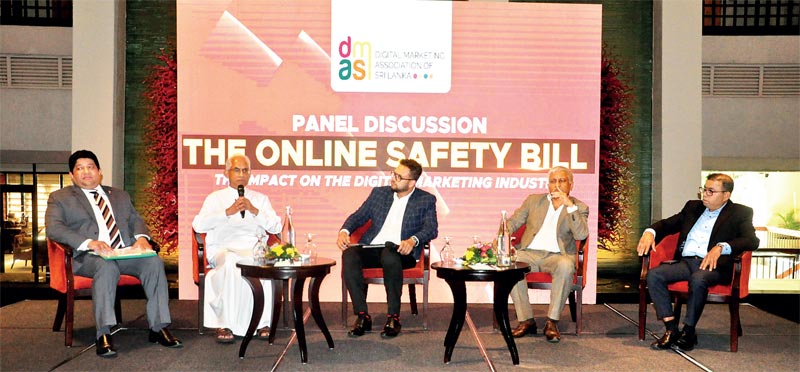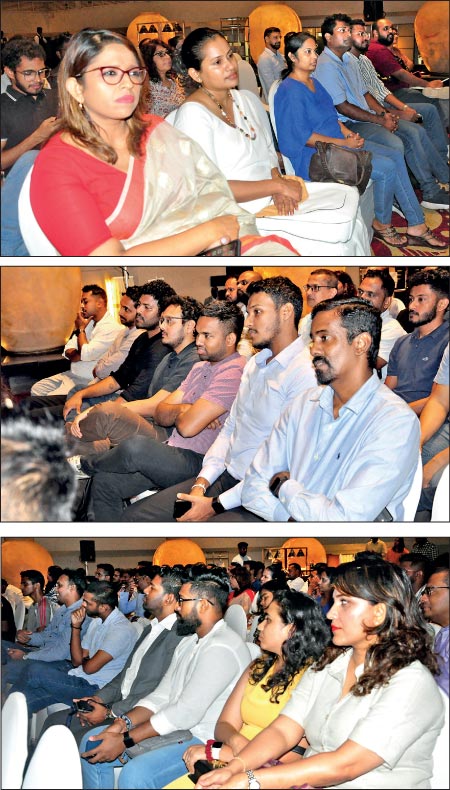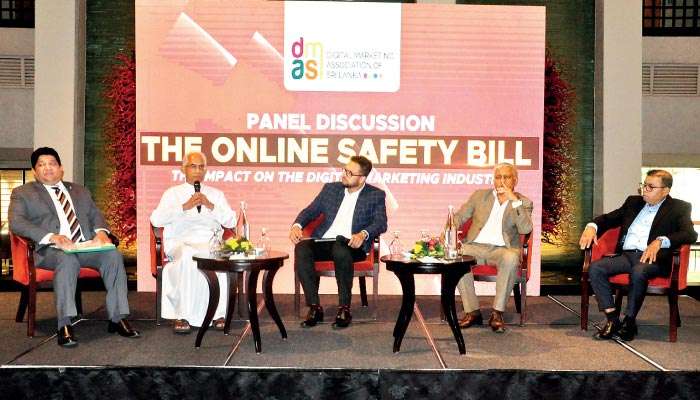
From left: Advisor to the President Jagath Wickramanayaka, Member of Parliament Eran Wickramaratne, DMASL Chairman Umair Walid, LIRNEasia Chairman Professor Rohan Samarajiva, Ogilvy Digital MD Lalith Sumanasiri – Photo by Sameera Wijesinghe
 Written by Meda de Alwis
Written by Meda de Alwis
The Digital Marketing Association of Sri Lanka (DMASL) recently held a panel discussion on the Online Safety Act No. 9 of 2024.
DMASL Chairman Umair Walid said there is concern among all stakeholders, including civil society, digital intermediaries, online influencers and the media, that the new law will impede free speech in online communities. Stated.
He said DMASL is actively urging the government to reconsider and amend the controversial Online Safety Act to ensure the seamless operation of Sri Lanka's digital marketing ecosystem.
“Sri Lanka Digital Marketing Association remains committed to working with the government to find solutions that will foster a thriving digital marketing ecosystem and benefit businesses, consumers and the country's digital economy as a whole. We strongly believe that amendments to the Online Safety Act are essential to address the specific challenges faced by the digital marketing industry in Sri Lanka. It could hinder our ability to significantly contribute to our country's digital economy,” Walid said.
DMASL urges the government to consider amending the law to align with the dynamic nature of the digital marketing sector, allowing it to operate efficiently and contribute significantly to the country's digital growth.
At the DMASL Forum, panelists highlighted key concerns: SJB Member of Parliament Eran Wickramarasna, LIRNEasia Chairman Professor Rohan Samarajiva, Advisor to the President Jagath Wickramanayake, and Ogilvy Digital Managing Director Lalith Sumanasiri .
During the debate, the Committee unanimously expressed concern about the adequacy of the Online Safety Bill, now law, to promote a healthy digital marketing environment and support the growth of a robust digital economy. The consensus among these influential figures highlighted the need for amendments to better align the law with the dynamic nature of the digital marketing industry.
While interference with freedom of expression was the main focus of the discussion, other vital issues raised included the constitutionality of the new law and the lack of adequate institutions to properly implement the positive aspects of the law. , and adverse political conditions that could potentially abuse the Constitution. It is the advantages of the new law itself and the unwarranted restrictions that professional online personnel will feel when engaging in their respective careers.
With large corporate budgets currently being invested in social media, it was speculated that digital marketing intermediaries would not be able to operate comfortably given the restrictions on speech set out in online safety laws. . A serious concern in this regard is that if found guilty, restrictions that amount to criminal offenses could impede the inflow of foreign investment.
Regarding the prohibition of online communications of false statements, section 12 of the Act states that “any person of any class, whether within or outside Sri Lanka, who poses a threat to national security, public health or public order or who promotes feelings of ill will; In case of enmity between persons, he commits an offense by communicating a false statement and on conviction is punishable with imprisonment for a term which may extend to five years or with a fine which may extend to five hundred thousand rupees or with both. or be fined.”
The new law takes precautions against riots. Article 14 states that online provocation or incitement to cause a riot means that if the crime of riot is committed, he will be sentenced to 5 years' imprisonment, and even if the crime of riot is not committed, he will be sentenced to 3 years' imprisonment. It is clearly stated that. .
Disruption of religious gatherings by making false statements is addressed in Article 15 of the new law, which states that “disruption of the lawful performance of religious services or gatherings, whether within or outside Sri Lanka, by transmitting false statements.” “a person who causes disturbance to ”
The discussion ended with a strong emphasis on the need for amendments. Panelists and audience members appealed to each other to create a movement to put pressure on legislators to change the law to make it fair and just.


